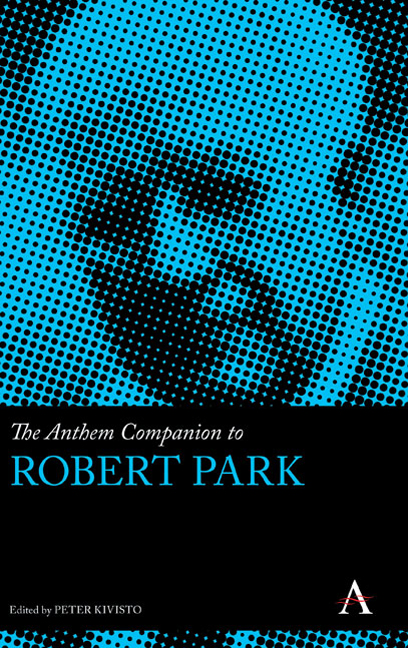Book contents
- Frontmatter
- Contents
- Introduction: The Legacy of Robert Ezra Park
- Chapter 1 A Twisted Path: Park, Gender and Praxis
- Chapter 2 Robert Park's Journey into Sociology
- Chapter 3 Beyond “Get the Seat of Your Pants Dirty in Real Research”: Park on Methods
- Chapter 4 The Basic Components of Social Action: Mead versus Park
- Chapter 5 Robert E. Park: Neglected Social Psychologist
- Chapter 6 Robert E. Park's Theory of Assimilation and Beyond
- Chapter 7 Robert Park's Marginal Man: The Career of a Concept in American Sociology
- Chapter 8 Marginality, Racial Politics and the Sociology of Knowledge: Robert Park and Critical Race Theory
- Chapter 9 The Cities of Robert Ezra Park: Toward a Periodization of His Conception of the Metropolis (1915–39)
- Chapter 10 The Impact of Robert E. Park on American Sociology of Religion
- Chronology
- Contributors
- Index
Chapter 7 - Robert Park's Marginal Man: The Career of a Concept in American Sociology
Published online by Cambridge University Press: 10 January 2018
- Frontmatter
- Contents
- Introduction: The Legacy of Robert Ezra Park
- Chapter 1 A Twisted Path: Park, Gender and Praxis
- Chapter 2 Robert Park's Journey into Sociology
- Chapter 3 Beyond “Get the Seat of Your Pants Dirty in Real Research”: Park on Methods
- Chapter 4 The Basic Components of Social Action: Mead versus Park
- Chapter 5 Robert E. Park: Neglected Social Psychologist
- Chapter 6 Robert E. Park's Theory of Assimilation and Beyond
- Chapter 7 Robert Park's Marginal Man: The Career of a Concept in American Sociology
- Chapter 8 Marginality, Racial Politics and the Sociology of Knowledge: Robert Park and Critical Race Theory
- Chapter 9 The Cities of Robert Ezra Park: Toward a Periodization of His Conception of the Metropolis (1915–39)
- Chapter 10 The Impact of Robert E. Park on American Sociology of Religion
- Chronology
- Contributors
- Index
Summary
Who now reads Robert Park? The answer, it turns out, is that many still do, and with good reason. Robert Ezra Park (1864– 1944) was one of the leading figures in what has come to be known as the Chicago school of sociology, which played a central and formative role in American sociology as a whole, especially from 1914 to 1933 when he taught at the University of Chicago (Matthews 1977; Raushenbush 1979). Park remains well known among American sociologists today for his pioneering work on urban life, human ecology, race and ethnic relations, migration and social disorganization, much of which continues to be assigned and read (though not uncritically) in graduate courses in the United States. This chapter focuses on Park's seminal concept of the “marginal man,” originally presented in his 1928 article “Human Migration and the Marginal Man” and later elaborated in the 1937 book The Marginal Man by Park's student Everett Verner Stonequist (1901– 79), who earned his doctorate at the University of Chicago in 1930. After examining the origins of the concept in the work of Park and Stonequist, I review the marginal man's subsequent career in American sociology. This review is not intended to be exhaustive or comprehensive. Instead, it aims to highlight several important lines of development: attempts at theoretical revision; application and extension of the concept to new areas of social inquiry, including the study of occupations, gender, and scientific innovation; and a revival of interest in the marginal man concept as it relates to Park's original interests in race and ethnic relations and migration. Throughout the chapter, I emphasize how the reception, interpretation and application of Park's concept was shaped by the ambiguities of the concept itself, which suggested the potential for maladjustment and disorganization but also for creativity and innovation, and by the changing social and historical context in which American sociologists worked. In the chapter's conclusion I outline some ways in which Park's concept remains relevant to present- day concerns, and I propose some directions for future research.
- Type
- Chapter
- Information
- The Anthem Companion to Robert Park , pp. 159 - 180Publisher: Anthem PressPrint publication year: 2017

